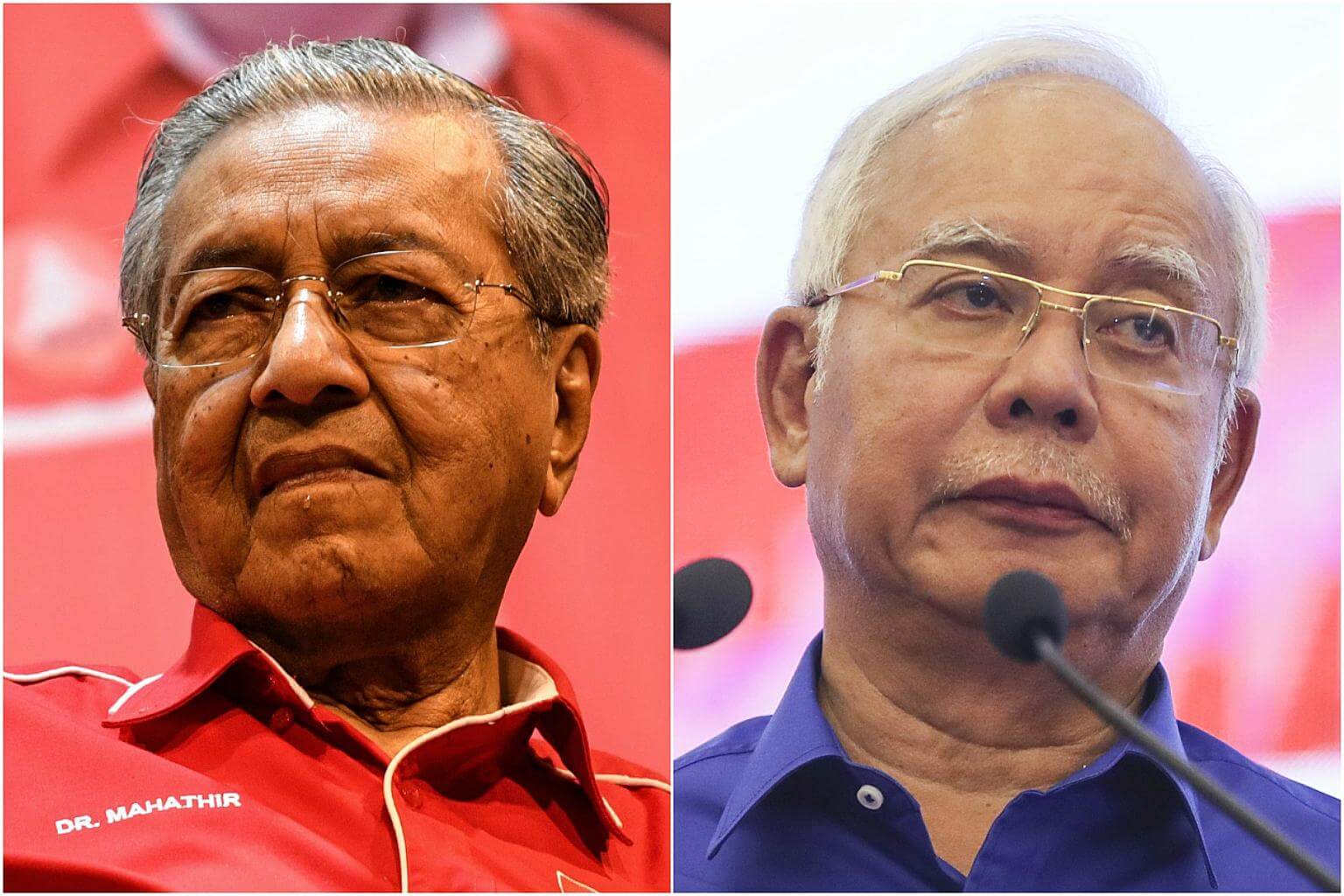Malaysian PM Mahathir Mohamad says Najib Razak may face charges within a short while
Sign up now: Get insights on the biggest stories in Malaysia

Prime Minister Mahathir Mohamad (left) said that he will soon bring a case against former prime minister Najib Razak, who has repeatedly denied wrongdoing after 2015 revelations that around US$700 million (S$933 million) - alleged to be 1MDB funds - appeared in his personal accounts before the previous election in 2013.
PHOTOS: AFP, EPA-EFE
TOKYO - Malaysian Prime Minister Mahathir Mohamad said on Tuesday (May 15) he is confident that prosecutors will soon have a strong case to charge former prime minister Najib Razak over graft claims at state fund 1MDB.
"We are slowly getting to the bottom of things and many of our senior officers are volunteering information accompanied, of course, by documents," Tun Dr Mahathir said in his first remarks to an international audience since becoming prime minister again after the May 9 election.
"We think that within a short while, we will have a case against him, we will be able to charge him," he said via video link to The Wall Street Journal (WSJ) CEO Council Meeting in Tokyo.
However, Dr Mahathir said he faces the problem of "trying to trust people to investigate him". "Some of these people who were with him had sided with him and we do not know who is going to be loyal to this new government," he said.
Asked if he might be willing to cut a deal to spare Datuk Seri Najib, if he were to offer information to recover part of the US$4.5 billion (S$6 billion) allegedly lost by 1MDB, Dr Mahathir would only say: "No deal."
Mr Low Taek Jho, better known as Jho Low, has been accused of masterminding the alleged theft of funds, and is believed to be at large in either China or Thailand.
Dr Mahathir said investigators will follow the money trail and that if Mr Low is found to be involved, the government will "want to bring him back and put him on trial".
Dr Mahathir also ruled out detention without trial for Mr Najib. He had imposed travel restrictions on Mr Najib last Saturday after it emerged that he was about to fly off to Jakarta for a short break.
In the 25-minute interview with WSJ's Asia enterprise editor Patrick Barta, Dr Mahathir was also asked about the transition of power to jailed politician Anwar Ibrahim - who is due to get a royal pardon and be released on Wednesday - and Chinese investments in Malaysia.
Dr Mahathir, who first led the country from 1981 to 2003 as head of its largest party Umno, is now prime minister under an agreement with the Pakatan Harapan (PH) coalition that he would eventually hand over power to Datuk Seri Anwar, whose Parti Keadilan Rakyat has the most MPs in the four-party alliance.
"In the initial stages, maybe lasting one or two years, I will have to be the PM and I will have to run the country," he said. "The reason why the public supported us is that they had faith in the leadership of the opposition to resolve problems, and this largely depends on the experience of the people leading the opposition. That includes me, of course."
Dr Mahathir, who turns 93 in July, added: "By the time I'm 95, I should be ready to step down, but I will play a role in the background even after I step down."
Mr Anwar's release will pave the way for the former deputy prime minister - who was sacked by Dr Mahathir in 1998 and is serving a jail term for sodomy, which he maintains is politically motivated - to run in a by-election and be an MP.
"Maybe he will have a seat in the Cabinet, which we haven't decided yet," Dr Mahathir said.
As for disagreements within PH over the Cabinet, Dr Mahathir said there were four parties in PH and he had to try and satisfy everyone. "Now it is accepted that the final decision will be made by me," he said.
As for Mr Anwar, as the leader of one of the coalition parties, "we expect he will have the same powers as the leaders of the other (three)".
Dr Mahathir also repeated his concerns over Chinese projects in Malaysia. China has been Malaysia's top source of foreign direct investment (FDI) and commerce, but he said on the campaign trail that its projects brought little benefit to Malaysians.
On Tuesday, Dr Mahathir said: "China is a friend of Malaysia, but when it comes to FDI, there is a difference in terms of definition."
"FDI means bringing in capital and technology, setting up plants in Malaysia, employing Malaysians up to the level of executives and that the product will be for the Malaysian market or for export," he said.
"But we do not consider coming into Malaysia, buying up huge chunks of land and developing counties and even cities and bringing in foreigners to live in this country as FDI."
He noted that some of these projects involve luxury apartments that cater largely to foreigners and are out of the reach of the average Malaysian.
As a result, Dr Mahathir said that Malaysia will look at restricting immigrants "and accept only a certain number that we can deal with and perhaps absorb".


